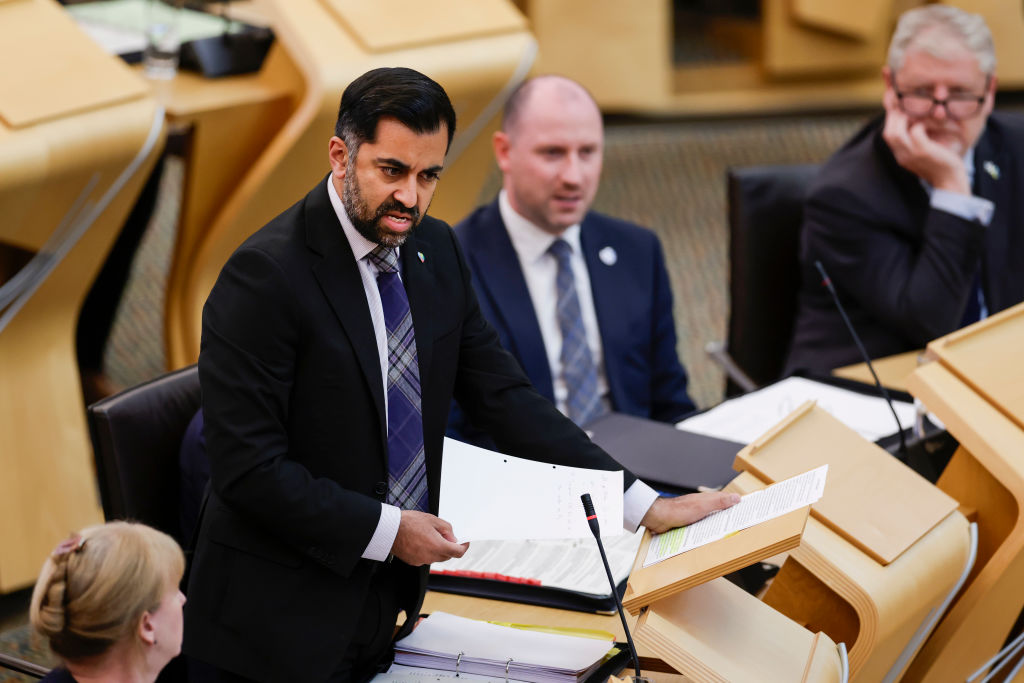There’s a moment in Bob Woodward’s gripping book Peril, the account of the buildup to and aftermath of the 2020 US presidential election, when Democrat fixer Anita Dunn tells Joe Biden, languishing in his party’s primary race, where his strength as a campaigner lies. Most candidates, Dunn mused, struggle with their message. Biden’s route to power, ultimately successful, lay in the fact that he was the message.
As Humza Yousaf passes the 100-day mark as first minister of Scotland, and new polling out today reveals that half of Scots believe he is doing a bad job, we can reasonably reflect that not only is he not the message, but that he is suffering from succeeding a politician who most definitely was.
Nicola Sturgeon was front and centre of everything the SNP did. Eight national elections in eight years meant she was never truly off the trail. This is true even during the first year of Covid when, despite a diligence to detail that put Boris Johnson to shame, there was always an eye on the May 2021 Holyrood election. Sturgeon took a superb political inheritance from Alex Salmond and stretched it out over almost a decade.
It’s strange to think of one momentous election victory after another as being a sign of failure. There is no doubt however that this permanent state of campaigning plus the need to keep the base energised repelled Scotland’s ‘soft middle’ — those ten to 15 per cent of voters who need to make the switch to the SNP for independence to become a reality. Ultimately, despite adulation from the nationalist core and left-leaners who despaired that Labour would never get its act together again, Sturgeon made zero progress.
Yousaf’s political inheritance has thus been dire. Any wish that he could use his opening three months to set the pace evaporated after less than week. He’s had to respond to stunning, and at times completely surreal, events that have made his first 100 days ‘reactionary’ in the most literal sense of the word.
Today’s polling makes brutal reading for a younger generation of nationalists who’ve known nothing but electoral success.
Over 50 per cent of people in Scotland believe the First Minister is doing a bad job — and only 23 per cent think he has done well. So, is it over before it’s really begun? Scottish Labour are set to sweep the central belt in 2024 and the Scottish Conservatives may pick off a couple of rural SNP seats too, right? But while this may come to pass, to write off Yousaf quite yet is premature, even by classical commentariat standards.
The ongoing police inquiry into SNP finances continues to loom over his premiership. That said, there are some approving noises coming out of government (including civil servants who have been there for decades) about the way Yousaf is conducting his business.
Cabinet meetings — normally half an hour or less under Sturgeon, where one person did the bulk of the talking — now take two hours with all attendees contributing. Yousaf may have styled his leadership campaign on continuity (and this perception lingers) but few could deny substantial changes to policy, such as on alcohol advertising or highly protected marine areas, have been executed. Yousaf and his team of advisers, galvanised by the return of Salmond’s former spin doctor Kevin Pringle, also spy an opportunity to use the new constraints of the UK Internal Market Act against Rishi Sunak’s administration.
Regardless of Scotland’s constitutional destiny, the Holyrood government needs much better relationships with business and local government. Time will tell whether the business recovery group, chaired by new economy secretary Neil Gray, delivers meaningful change, but its establishment is at least a start.
Crucially, nobody — especially unionists — should write off the outcomes of last month’s independence convention in Dundee. Yes, the emergent policy of taking ‘victory’ at the next UK election as a mandate for a referendum was mangled, but too many have missed that this was completely deliberate. The fact it is open to interpretation is very much the point, whilst also putting the concept of the SNP winning seats back as the core deliverable — in place of Sturgeon’s confused and surely impossible bid for 50 per cent of the vote. The convention achieved its main objective of projecting some degree of unity, whilst also quietly closing the door on the Sturgeon era.
Today’s polling, alongside that Panelbase poll predicting the SNP could lose over half of their seats to Labour at the next election, makes brutal reading for a younger generation of nationalists who’ve known nothing but electoral success. Even Yousaf’s most committed advocates would admit he has limited time to deal with the huge number of challenges he faces. Many of these are internal: even if the First Minister negotiates a way past Scottish Labour in 2024, he can then expect something approaching civil war. A number of former SNP MPs (as of this morning, seven have announced they will be stepping down) will likely make a bid for the Scottish parliament in 2026, trying to supplant those already there. It won’t be pretty.
Despite such hurdles, it is important to consider how many political ‘certainties’ have not come to pass in recent times. The curtain coming down on Yousaf’s stint at the top next year is very possible, but not a given. Joe Biden made a career — and a presidency — out of taking low political expectations and smashing opponents around the head with them. Humza Yousaf is certainly not the message, but that doesn’t mean it is all over for him yet.






Comments